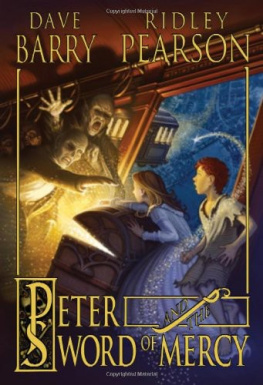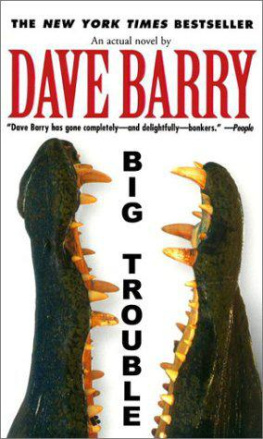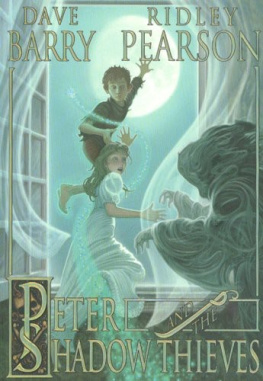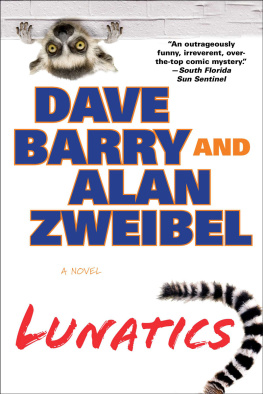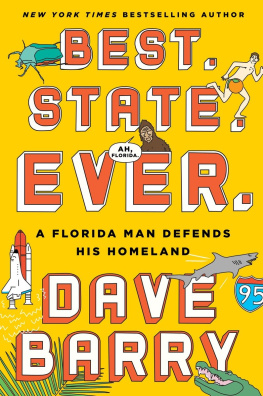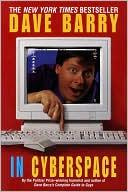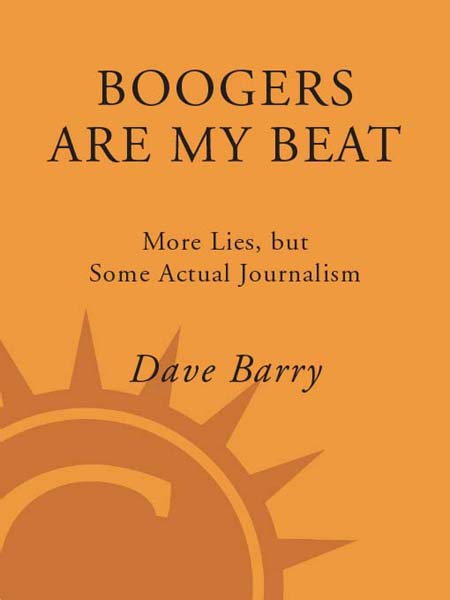
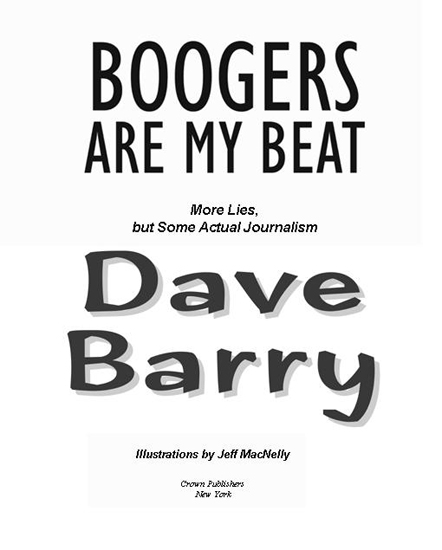
Contents
Now It's Time to Say Thanks for the Chads
That Don't Count
Campaign Trail, Freeways, Finally Lead to a
Vast Parking Lot
Frozen Lips, Barefoot Skatersand Who Let
All Those Dogs Out?
Camping at Wal-Mart Parking Lot Is Survival
of Fittest
Choice Between Death and Taxes Gets Easier
and Easier
Don't Forget to Consider Feng Shuiand
Other Deck Tips
Was It Hi-ho or Hi-yo, or Did the Lone Ranger
Have a Lisp?
He Didn't Just Buy a HouseHe Bought a
Home Repair Industry
How to Drive a Man Wild with Desire?
Even a Stiff Breeze Works
Your Child Deserves a Halloween Costume
by Calvin Klein
Terror on Flight 611There's a Baby on Board,
Ready to Shriek
By the Way, Those Turkey Snakes Have Giant
Fangs, Too
A GPS Helps a Guy Always Know Where His
Couch Is
Ban CellphonesUnless You're Attacked
by a Giant Squid
There's a Hoover Dam... and Now, the
Dave Sewage Lifter
Introduction: Boogers Are My Beat
I 'm not a real journalist. I'm a humor columnist. When real journalists are out interviewing experts about important issues such as terrorism and the economy, I'm at home, sitting in front of my computer in my underwear, trying to decide which animal name is funnier, hamster or gerbil.
But because I work for a major newspaper, The Miami Herald, I sometimes get to go to major news events, such as political conventions, the Olympics, Elizabeth Taylor fragrance launches, etc. My usual tactic at such events is to lurk among the real journalists as they interview a newsmaker. I frown thoughtfully at the newsmaker and write stuff in my notebook, just like my media colleagues; the difference is that they're writing down what the newsmaker is saying, whereas I'm writing notes like, GREEN THING STUCK IN TEETH or NOSE SIZE OF EGGPLANT.
Over the past two decades, I've used this tactic to cover dozens of major national and international news events, and I've written hundreds of columns about them. When my editor, Betty Prashker, and I were putting this book together, we decided to take a look back at those older columns to see if any of them were worth including here. What we found, frankly, surprised us: Despite the fact that those columns concerned, in some cases, events that took place years ago, a surprising number of them, when viewed from the perspective of recent events, areand I say this in all modestycomplete gibberish. They're filled with obscure references to people who, at one time, apparently were quite famous for some reason, but whose names no longer ring a bell. Al Gore, for example.
So Betty and I threw most of the columns out. But there were some that we thought would be worth including, and we've started the book with those. Toward the end of the book we've included some more recent columns, so you can judge how much I have matured as a writer. Actually, I can just tell you here: I have not matured at all. Thank God. Maturity is a crippling handicap for humor columnists. It's like height for jockeys, or ethics for lawyers.
The first section of this book presents some columns I wrote about presidential politics, which, in my professional opinion, is the mother lode of humor material. We have a lot of funny institutions in this countryinfomercials, California, Al Sharpton, organized religionbut for consistently wacky hijinks, you cannot beat the way we go about choosing our maximum leader.
I've been covering presidential politics since 1984, when the Herald sent me to New Hampshire to write about the presidential primaries. I went up there and wrote about what goes on in the New Hampshire primary; namely, a bunch of candidates in dark suits, accompanied by dark-suited entourages, race frantically around the state, grasping voters' hands and telling themwith all the sincerity of a guy in a bar declaring his love to a woman he met three drinks earlierhow deeply they care about New Hampshire.
I thought my reports were pretty accurate, but not everybody at the Herald liked them. I was especially criticized for one column about a campaign appearance by Sen. John Glenn, in which I pointed out that he was not an electrifying speaker. I believe my exact words were: He could not electrify a fish tank if he threw a toaster into it.
This column angered a member of the Herald's editorial board. He was a serious journalist, and he wrote a serious memo to our executive editor, objecting to my coverage of the primary campaign. The memo said: When we treat so prominently such serious business as if it were pratfall comedy, I believe that we demean our reputation as a serious newspaper. I seriously believe that such treatment reassures the public that cynicism about politics is smart.
Well, heaven forbid that we journalists should make the public cynical about politics. But having covered five presidential campaigns, I frankly do not know what you could write about our political process that would make it appear any stupider than it actually is.
Of course when we think about the words stupid and politics together, we naturally think about the 2000 presidential election, especially the role played by my state, Florida.
What follows is a series of columns I wrote for the Herald about that election. The first one, which appeared the day after Election Day, was an analysis of the election results. The joke was supposed to be that I wrote this analysis without knowing who the winner was. Little did I realize that this would still be a mystery weeks after this column appeared.
That column is followed by some more about the election mess, followed by one on the inauguration of George W. Bush, an event that gave a new definition to the word fun.
Dave Barry
Part One
A Wacky Path for Politics
M emo: ELECTION 2000
Before I analyze the presidential election, I want to make a statement, on behalf of South Florida, to the state and local candidates who ran all those TV ads, especially Elaine Bloom, Clay Shaw, Bill McCollum, and Bill Nelson: We hope that you and all your media advisers rot in Campaign Hell, okay? We hope that demons tape your eyelids open and force you to watch your own TV commercials. We hope that every thousand years, the demons hold an election to decide which one of you should be allowed to leave Campaign Hell, and the winner is always: None of the Above.
There! I feel better! Now, let's analyze the presidential election. As you can imagine, I was up all night scrutinizing the returns. (NOTE TO EDITOR: The truth is, I'm writing this while the polls are still open. I don't plan to watch the returns. I plan to watch Buffy the Vampire Slayer and be asleep by 9:15 P.M. So I need some help finishing this analysis.)
The key to presidential elections is the Electoral College, an institution created by the Founding Fathers so that Tim Russert would have something to talk about. Under this system, each state receives a certain number of electoral votes, based on how stupid the state's motto is. Thus, New York (motto: Driver Carries No Cash) has 33 electoral votes; whereas North Dakota (motto: Coming SoonPlumbing!) has none.
This system can produce some quirky results. In 1884, the Electoral College declared that Grover Cleveland was the winner, even though it turned out that there was no such person. Later, the Electoral College got a bee in its bonnet and elected Franklin D. Roosevelt president twenty-seven times in a row. Still later, it elected Richard M. Nixon, despite abundant documented evidence that he was Richard M. Nixon.
Next page

